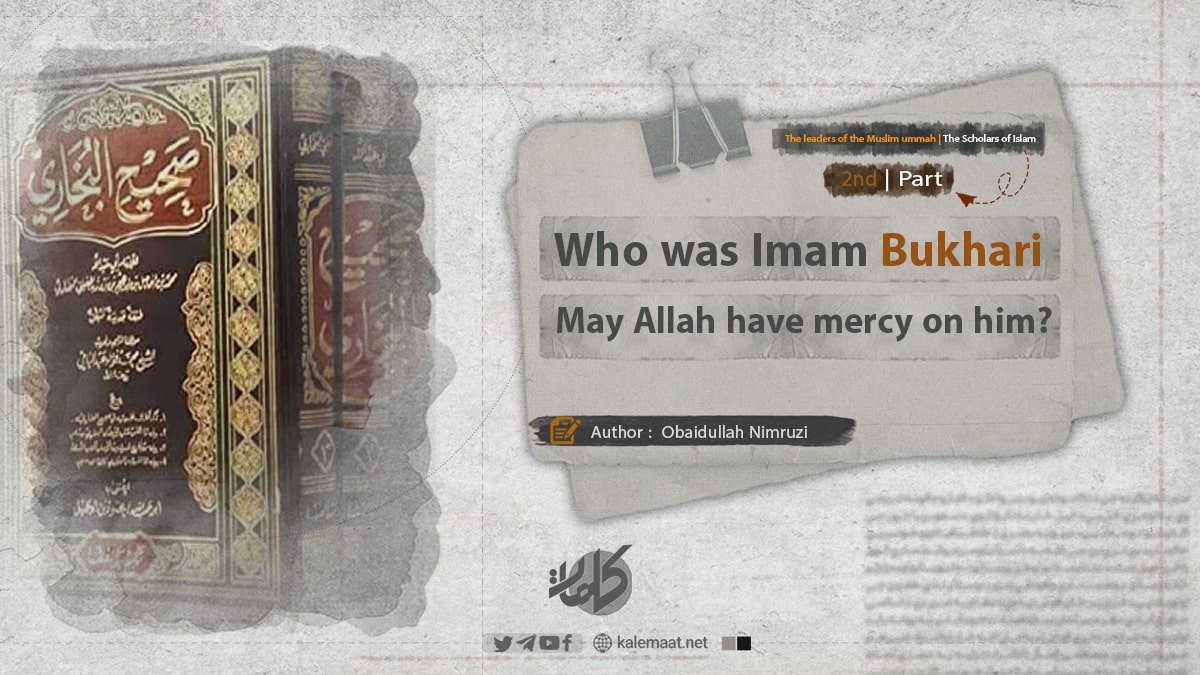
Author: Obaidullah Nimruzi
Who was Imam Bukhari (may Allah have mercy on him)? (2nd part)
The intelligence and genius of Imam Bukhari, may Allah have mercy on him
The traces of decency and intelligence were visible in his face from his childhood; If he had not yet reached the age of puberty, he had acquired enough information about religions, and at the same time, he made some of his elders aware of their scientific mistakes, and at the age of 16, he had read famous books and listened to many hadiths. He himself said that “I memorized seventy thousand hadiths when I was a teenager”. Imam Zahabi says about this period of his life: “He began composing and narrating hadiths while there was still no hair on his face.
Imam Bukhari was one of the geniuses of the time in terms of recording power and memory power; Whenever he read a book once, that book would remain in his memory.
Imam Bukhari had not reached the age of ten when he memorized the Qur’an and learned many hadiths in a school in Bukhara.
What astonished the contemporary scholars of Imam Bukhari was the peak of Imam Bukhari’s memory not only in the text of hadiths; Rather, in numerous documents, all the hadiths and even the first and last names of its narrators were in the documents. When the power of his memory and recording was published in the Islamic world, some people felt proud of it, and some others, out of jealousy, considered such power to be an exaggeration and unacceptable for Imam Bukhari’s memory.
Attributes and characteristics of Imam Bukhari, may Allah have mercy on him
Bukhari was an extremely tolerant person, a person of modesty, with courage, Imam’s generosity, asceticism and piety. Every dawn, he prayed “thirteen” rakats, and in the holy month of Ramadan, he finished the Qur’an in three nights, and always gave charity to the poor and needy. Once he was standing in prayer when a bee entered his clothes and stung seventeen places on his body, but he did not stop his prayer. When he finished the prayer, he said: See what bothered me in the prayer? They saw that it was a bee and it had stung seventeen places on his body.
Abdullah bin Muhammad Sarifi says: “I was with Imam Bukhari in his house when his maid came and wanted to enter the house, suddenly her foot slipped, and the Imam said to her how do you walk?” The maid replied: How can I walk when there is no place to go? Imam Bukhari raised both his hands and said: Go! You are free, Imam Bukhari was told that, that slave girl upset you and you freed her? In response, he said: I satisfied myself by freeing him.
Acceptance of Imam Bukhari’s prayer may Allah have mercy on him
He was the (Wali) of Allah. he said: “I prayed twice and immediately Allah answered my prayer; From then on, I was afraid that Allah would reward all my good deeds in the world, I stopped praying for worldly matters.
The affliction of Imam Bukhari, may Allah have mercy on him
Imam Bukhari was a great person. The rule is that when a person progresses, he suffers; Imam Bukhari faced many problems, while these suffers, forced him to leave the country.
The story of the first expulsion of Imam Bukhari, may Allah have mercy on him
When he returned from Baghdad, he started giving fatwas; But one of the elders of Bukhara forbade him from giving fatwas, but he did not accept. If the imam was asked about the issue of breastfeeding, does it prove the sanctity of breastfeeding by drinking animal milk? After the Imam’s fatwa, there was so much excitement that he left the country. But the authenticity of this story is doubtful; Because the issue attributed to Imam Bukhari is not true. This was the first time Imam Bukhari was expelled from Bukhara.
Imam Bukhari went out for the third time in the year 250 to Nishapur. Imam Muhammad bin Yahya Zaheli said: “We are going to welcome him.” Imam Muslim said: “He was welcomed in such a way that no great governor had ever been welcomed.
And in the matter that they said, the Qur’an is uncreated, and the actions of worshipers are created; Some said that Imam Zaholi told the people that you should learn hadith from him. When the people went to Imam Bukhari, it was difficult for Imam Zaholi, so he made a plan and asked all the people and students not to go to his assembly again. At this time, Imam Muslim left the lesson of Imam Zaholi and threw all the hadiths he had heard from him and said: “I will not leave Imam Bukhari”. Imam Ahmad bin Salma got up from the assembly with him.
Imam Bukhari left Nishapur, and the people of Bukhara welcomed him very much and people used to go to him for lessons and the Amir of Bukhara ordered him to come to his court and teach his children the science of hadith. But Imam Bukhari said: “I do not humiliate science”. The ruler ordered to leave the city. This time, they prayed that, Lord, show them; To their family, to their children and their souls; Not much time passed when the people of Bukhara rebelled against the ruler and on behalf of the Zahiriya government removed him from the seat of power and put him on a donkey and drove him around all over Bukhara and did not leave him any dignity.
And they left there and went to “Bikand” and there was also a dispute over an issue and then the people of Samarkand invited them, and they went to an area called “Khartang” and it didn’t take long before they fell ill and died there.
continues…


